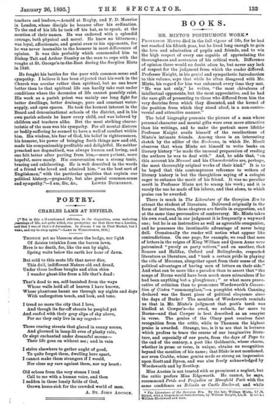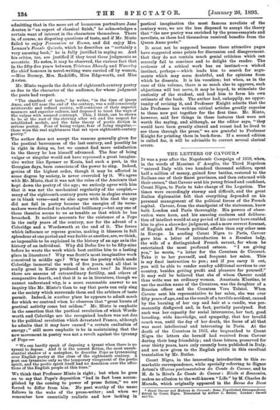BOOKS.
MR. MINTO'S POSTHUMOUS WORK.* PROFESSOR MINTO died in the full vigour of life, for he had not reached his fiftieth year, but he lived long enough to gain the love and admiration of pupils and friends, and to win the high respect of every one capable of appreciating the thoroughness and acuteness of his critical work, Difference of opinion there would no doubt often be, but never any lack of respect for the judgment from which the reader differed. Professor Knight, in his genial and sympathetic Introduction to this volume, says that while he often disagreed with Mr. Minto, his regard for him was enhanced every time they met. " He was not only," he writes, " the most chivalrous of intellectual opponents, but the most appreciative, and he had the rare gift of presenting to those who differed from him the very doctrine from which they dissented, and the kernel of the position from which they stood aloof, in a non-contro- versial and attractive manner."
The brief biography presents the picture of a man whose personal character and mental gifts were even more attractive than his writings, and to make the portrait more lifelike Professor Knight avails himself of the recollections of Minto's intimate friends. Among these is an interesting sketch by the editor of the Bookman, in which Dr. Nicoll observes that when Minto set himself to write books on literary history "he made the unusual preparation of reading the authors he was to deal with." And, he adds that, "on this account his Manual and his Characteristics are, perhaps, the most thoroughly original works of their kind." It is to be hoped that this contemptuous reference to writers of literary history is but the thoughtless saying of a eulogist eager to enhance the merit of his friend. It was no peculiar merit in Professor Minto not to scamp his work ; and it is surely the use he made of his labour, and that alone, to which praise can be awarded.
There is much in The Literature of the Georgian Era to attract the student of literature. Delivered originally in the form of lectures, these chapters are fertile in suggestion, and at the same time provocative of controversy. Mr. Minto takes his own road, and in our judgment it is frequently a wayward one; but he is an instructive as well as agreeable companion, and he possesses the inestimable advantage of never being dull. Occasionally the reader will notice what appear like contradictions. On one page, for example, we read that men of letters in the reigns of King William and Queen Anne were patronised "purely as party writers," and on another, that Somers and Halifax, Oxford and Bolingbroke, respected literature as literature, and " took a certain pride in playing the role of Maecenas, altogether apart from their sense of the political advantages of having men of letters on their side." And what can be more like a paradox than to assert that " the songs of Burns would have been much more miraculous if he had been anything but a ploughman ; " or what more provo- cative of criticism than to pronounce Wordsworth's Conven- tion of Cintra "commonplace,"—a pamphlet which Canning declared was the finest piece of political eloquence since the days of Burke ? The mention of Wordsworth reminds us that in Mr. Minto's judgment that poet's torch was kindled at Cowper's—he owed, we submit, far more to Burns—and that Cowper is best described as an essayist in verse. The genius of the Olney poet receives faint recognition from the critic, while to Thomson the highest praise is awarded. Strange, too, is it to see that in lectures which profess to trace the course of our imaginative litera- ture, and especially of our poets, from the days of Pope to the end of the century, a poet like Goldsmith, whose charm., whether in prose or verse, is unique, obtains no recognition beyond the mention of his name; that Blake is not mentioned, nor even Crabbe, whose genius made so strong an impression upon Scott and Byron, and was also freely acknowledged by Wordsworth and by Southey.
Miss Austen is not treated with so prominent a neglect, but the critic prefers Miss Edgeworth. He cannot, he says, recommend Pride and Prejudice or Mansfield Park with the same confidence as Belinda or Castle Rackrcnt, and while • The Literature of the Georgian Era. By the late William Minto,I.T.D. Edited, with a Biograohi:al Introduction, by William Knight, LLD. Ie. ud, William Blackwood and Sons.
admitting that in the mere art of humorous portraiture Jane Austen is " an expert of classical finish," he acknowledges a certain want of interest in the characters themselves. There is, of course, no disputing questions of taste, and if Mr. Minto failed to enjoy Persuasion or Emma, and did enjoy Mrs. Lennox's Female Quixote, which he describes as "certainly a very amusing book," he is fully justified in saying so. And his critics, too, are justified if they treat these judgments as eccentric. He notes, it may be observed, the curious fact that in the fifty-five years between Tristram Shandy and "{Travel-ley the chief honours in novel-writing were carried off by women, —Miss Barney, Mrs. Radcliffe, Miss Edgeworth, and Miss Austen.
Mr. Minto regards the defects of eighteenth-century poetry as due to the character of the audience, for whose judgment the poets had respect.
"The standard of taste," he writes, "in the time of Queen Anne, and till near the end of the century, was a self-consciously aristocratic and refined society, self-conscious of their superior manners and superior culture, and disposed to treat the ways of the vulgar with amused contempt. This, I think, can be shown to be at the root of the striving after wit and the respect for established models, and the false theory of poetic diction in serious poetry. Fear of being vulgar, fear of being singular,— these were the real nightmares that sat upon eighteenth-century poetry."
The author does not accept the reasons generally given for the poetical barrenness of the last century, and possibly he is right in doing so, but we cannot find more satisfaction in the theory he has himself advanced. The fear of being vulgar or singular would not have repressed a great imagina- tive writer like Spenser or Keats, had such a poet, in the Georgian days, been conscious of the power to sing. Indeed, genius of the highest order, though it may be affected in some degree by society, is never overruled by it. We agree with Mr. Minto, that it was not the rules of the Ancients that kept down the poetry of the age ; we entirely agree with him that it was not the mechanical regularity of the couplet,— many of the eighteenth-century poets wrote in elegiac stanzas or in blank verse—and we also agree with him that the age
did not fail in poetry because the energies of its verse- makers were directed to rhetorical brilliancy ;—but any one of these theories seems to us as tenable as that which he has broached. It neither accounts for the existence of a Pope
in the early years of the century, nor for the advent of a Coleridge and a Wordsworth at the end of it. The forces which influence or repress genius, making it blossom in full splendour at one period and wax feeble at another, are, we think, as impossible to be explained in the history of an age as in the history of an individual. Why did Defoe live to be fifty-nine before he wrote the work which best entitles him to a lasting place in literature ? Why was Scott's most imaginative work conceived in middle age ? Why was the poetry which made Coleridge immortal the work of five years, and all that is really great in Keats produced in about two ? In Nature there are seasons of extraordinary fertility, and others of comparative dearth, and that it is so in literature, though we cannot understand why, is a more reasonable answer to an inquiry like Mr. Minto's than to say that poets can only sing as the society which surrounds them and the arbiters of taste permit. Indeed, in another place he appears to admit much for which we contend when ha observes that "great bursts of poetical activity come but seldom." Mr. Minto is emphatic in the assertion that the poetical revolution of which Words- worth and Coleridge are the recognised leaders was not due to the political revolution which devastated France, although he admits that it may have caused " a certain exaltation of energy ; " still more emphatic is he in maintaining that the new movement in poetry was not a revolt against the tyranny of Pope
" We can hardly speak of deposing a tyrant when there is no tyrant to depose. And it is the merest fiction, the most unsub- stantial shadow of a metaphor, to describe Pope as tyrannising over English poetry at the close of the eighteenth century. A poet can tyrannise only as the temporary vicegerent of the poetic spirit, and the poetic spirit itself had no dominion over the affec- tions of the English people at this time."
We think that Professor Minto is right ; but when he goes on to say that Pope's deposition "had in fact been accom- plished by the coming to power of prose fiction," we are
forced to differ from him. No poet worthy of the name follows in the wake of the prose-writer ; and when we remember how essentially realistic and how lacking in
poetical imagination the most famous novelists of the century were, we are the less disposed to accept the theory that " the new poetry was enriched by the prose-essayists and novelists, as these had themselves received benefits from the Queen Anne poets."
It must not be supposed because these attractive pages have suggested some points for discussion and disagreement. that they do not contain much genial criticism which can scarcely fail to convince and to delight the reader. The reviewer of a critical work has an instinct—a wicked instinct, perhaps—which leads him to search for argu- ments which may seem doubtful, and for opinions from which he dissents. It is his vocation; but when, as in the case of this volume, there is so much also to approve, such objections will but serve, it may be hoped, to stimulate the curiosity of the student, and lead him to form his own estimate of the book. The author had, unhappily, no oppor- tunity of revising it, and Professor Knight admits that the late Professor has written critical articles greatly superior to those now put together for the first time. Mr. Minto, however, said few things in these lectures that were not worth the saying, and although, as the editor says, " they would have been greatly altered and recast had he lived to see them through the press," we are grateful to Professor Knight for printing them in book-form. If a second edition is called for, it will be advisable to correct several clerical errors.



















































 Previous page
Previous page